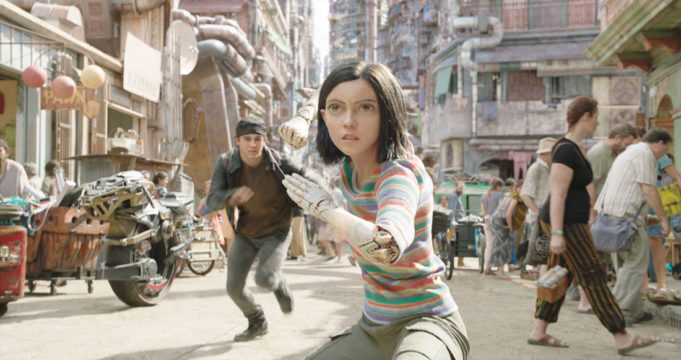This was always going to happen. Alita: Battle Angel is the first successful Hollywood adaptation of a Japanese manga comic in history. Robert Rodriguez was as likely a filmmaker as anyone to pull off this trick. That may sound like a strange thing to say about a Latino director who runs his own shop in Texas and makes all his films entirely in the state, but this longtime anime fan has brought us here.
The story begins in the 26th century, as a global war has reduced the world’s population to one megalopolis, where Dr. Dyson Ido (Christoph Waltz) finds an intact cyborg head in a scrapyard and grafts it onto a robot body in his shop, creating a new being whom he names Alita (Rosa Salazar). Since she has no memories, he explains the world’s workings to her and us: A permanent underclass lives on the Earth in Iron City, while the privileged few live in a city in the sky called Salem. Officially, there’s no way to ascend, but unofficially, it can be done for the right price or by becoming the ultimate champion in motorball, a violent sport for cyborgs that combines X Games, roller derby, and the Hunger Games. The doctor has no intention of letting Alita into that world until he sees her superhuman fighting skills emerge when his life is threatened.
This film is the true heir to Blade Runner, in part because its vision of the future looks nothing like Ridley Scott’s familiar one. Instead, Iron City is streaked with sunshine and the ruins of great buildings that make it look like some futuristic version of ancient Rome, only with all the street signs printed in English, Spanish, and Chinese. It’s populated, too, with engagingly odd peripheral characters, like the Australian bounty hunter — played by the Lawnmower Man himself, Jeff Fahey — who sics his robot dogs on fugitives. (One of the bad guys kills a flesh-and-blood stray dog for fun in his presence. It does not sit well with him.) The slick look of this film is in keeping with the spirit of the Japanese manga series that it’s based on but also distinguishes it from so many other futuristic films by creating a sense of bustling life that has considerable perils but doesn’t look like a completely miserable place to be.
(Casting non-Asian actors here leads us into questions like: Is it whitewashing if the lead actress is Latina? Or if her face isn’t onscreen? And does a robot even have ethnicity? Someone with more patience than me will have to tackle this, because honestly, thinking about these things is making my head hurt.)
All of the film’s visual splendor would be nicer if its emotional parts were up to the task. Sadly, Ido’s fatherly relationship to Alita is sentimentalized, as is her romance with a fully human boy (Keean Johnson) who’s concealing a secret about how he survives on the streets. I like Salazar — she was a rare bright spot in those grim Maze Runner sequels — so it’s a shame that her face is hidden behind a mocapped CGI rendition with Margaret Keane-style eyes. It doesn’t help that the story’s underlying questions about the line between human and machine, rooted in the 1990s, are old news by now. This script was written by James Cameron and his writing partner, Laeta Kalogridis, which explains why the character interactions come off as so much soap opera. At least Rodriguez’ direction is far more palatable.
Anyway, no one goes to Rodriguez movies to have their heartstrings tugged. They go for scintillating fight sequences like the one in the motorball arena, when Alita is forced to choose between winning the contest and saving her boyfriend and decides to do both. There’s another one, later, when she squares off with a bulked-up and pissed-off cyborg (Jackie Earle Haley) and refuses to give up even after she’s reduced to one working limb. Perhaps the 3D version isn’t worth the upcharge, but it is worth seeing this flawed visionary who’s always looking to push the boundaries of what is possible in cinema. In Alita: Battle Angel, Rodriguez succeeds like he never has before.
Starring Rosa Salazar and Christoph Waltz. Directed by Robert Rodriguez. Written by James Cameron and Laeta Kalogridis, based on Yukito Kishiro’s comic book series. Rated PG-13.












